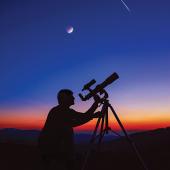The Sky Doctor
The Wild and Woolly West of (mostly) bygone days was so-called for a reason, for it could also be hazardous. There was danger of fever, rattlesnake bite, broken bones, and the occasional bout of lead poisoning, for which the frontier doctor came in mighty handy. Even the sky advertised the value of a good health care plan, as it does today, in the form of Ophiuchus, the snake-bearer, who began his career as the Doc Adams of the Wild and Woolly Greece of legend.
Ophiuchus sits in a prominent place in the summer night sky, though his medium bright stars make him and his pet snake an exercise in pattern finding. He fills up the space between Scorpius the Scorpion, who scuttles along the southern horizon this time of year, and Hercules the strong man, with whom he almost butts heads. Look for a tall, slightly bulging house-shape of stars. The triangle at the top marks the roof of the house—and also Ophiuchus’ head and shoulders; the stars at the base of the house, a little above the hook-shape of Scorpius, mark the feet of the snake-bearer. Or perhaps his fists as he grapples with his charge, Serpens the serpent, which wriggles out in two curvy lines of stars on either side. At the same time, he has to avoid stepping on Scorpius—and this particular summer, Jupiter as well, shining brightly just above the scorpion. Ophiuchus and Serpens lie due south in the sky at nightfall in mid-June, and by mid-July, have shifted toward the southwest by the time it gets dark.
Ophiuchus was not always the keeper of the snake. He started out in life as one Aesculapius, a healer of ancient Greece. One day he made a house call on King Minos, whose son, Glaucus, had gotten to playing too roughly and accidentally drowned himself in a large jar of honey. While the doctor examined the sticky and unfortunate boy, wondering how to tell the king that his son and heir had raided the honey pot once too often, a snake slithered out of the bushes and the annoyed Aesculapius whacked it a good one. What should he see then but a second snake slither into view carrying a sprig of herb in its mouth. The second snake laid the herb on the body of the first, and Aesculapius’ victim wriggled back to life. The surprised healer snatched up the herb as the snakes made their escape, and placed it on the chest of Glaucus, who likewise wriggled back to life. Clearly, Aesculapius had something here.
The doctor wasted no time in acquiring a goodly supply of the magic herb, and was soon raising people from the dead left and right, enhancing both his reputation and his pocketbook in the process. But Hades, god of the underworld, was not amused; the doctor was single-handedly depopulating his realm. Hades complained to his brother Zeus, king of the gods, and Zeus realized that Aesculapius’ tampering with the Circle of Life could have unintended consequences. So he sent off his eagle, Aquila, to smite the doctor with a large thunderbolt. Since Aesculapius had kept his secret close to his chest, there was no one to lay the herb on his chest, and so the doctor and his secret died on the spot.
Still, Zeus gave Aesculapius points for being enterprising, and so he placed the doctor in the sky—along with the great snake that inadvertently provided the doctor with the secret, and there they remain today. Given his new profession, Aesculapius also got a new alias in the name Ophiuchus, which means “snake-bearer.” Serpens’ claim to fame—other than holding the knowledge of the magic herb—is that it’s the only constellation in the sky that exists as two separate parts: Serpens Caput (the head) on the right side of Ophiuchus, and Serpens Cauda (the tail) on the left. Aquila hovers nearby and above the pair, ready with another thunderbolt just in case they get any more enterprising ideas.
In the meantime, Ophiuchus has his hands full, wrestling his giant rattler, watching his step so he doesn’t get stung by the scorpion, and keeping an eye on the eagle (some might say buzzard?) circling overhead. He’d fit right in to the Wild and Woolly West.
And on the next clear, dark, starry summer night, watch your step as well as you go out to locate the doc and his pet—lest you need to find a medical professional of your own for that twisted ankle. Enjoy the night sky, and may all your bumps and bruises this season be small ones!
[BLURB]
Jim Manning is executive director of the Astronomical Society of the Pacific in San Francisco, California, but maintains Montana roots just "Outside Bozeman."











